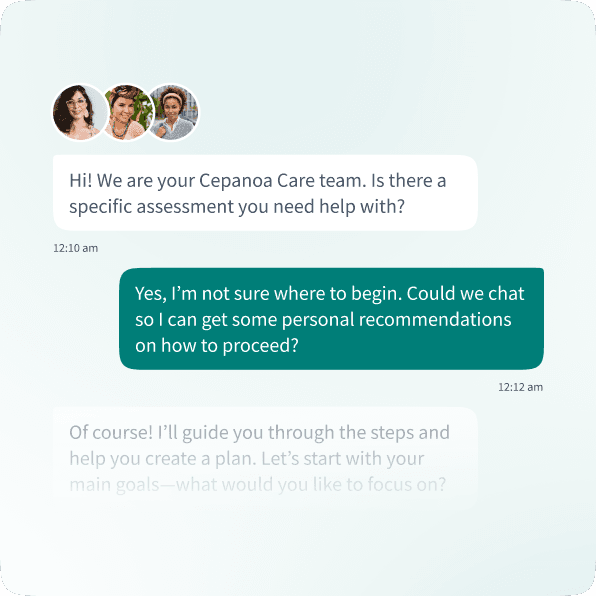
What Happened Then Still Matters Now. Let’s Understand Why.
Health isn’t just what we see - it’s what we’ve lived.



Adverse Childhood Experiences (ACEs) aren’t invisible - it’s just not yet translated into your health today.
We translate the science of ACEs into precision care that’s personal, preventative, and rooted in the biology of stress, emotion, and long-term health. Because your symptoms aren’t random—and neither is your path to healing.
Restoring Social Health with Peer Support and Community.
Care for Those Living with Complex Trauma
Adverse Childhood Experiences (ACEs) aren’t invisible - it’s just not yet translated into your health today.
We translate the science of ACEs into precision care that’s personal, preventative, and rooted in the biology of stress, emotion, and long-term health. Because your symptoms aren’t random—and neither is your path to healing.
Restoring Social Health with Peer Support and Community.
Care for Those Living with Complex Trauma
Adverse Childhood Experiences (ACEs) aren’t invisible - it’s just not yet translated into your health today.
We translate the science of ACEs into precision care that’s personal, preventative, and rooted in the biology of stress, emotion, and long-term health. Because your symptoms aren’t random—and neither is your path to healing.
Restoring Social Health with Peer Support and Community.
Care for Those Living with Complex Trauma

Learn more about you.
Uncover how childhood shaped your brain, body, and behavior.
Uncover how childhood shaped your brain, body, and behavior.
What are ACEs?
What are ACEs?
What are ACEs?
Adverse Childhood Experiences (ACEs) are potentially traumatic events that occur in childhood and may affect the health of a person throughout their lifetime.
Adverse Childhood Experiences (ACEs) are potentially traumatic events that occur in childhood and may affect the health of a person throughout their lifetime.
Adverse Childhood Experiences (ACEs) are potentially traumatic events that occur in childhood and may affect the health of a person throughout their lifetime.
Abuse
Abuse—whether physical, emotional, or sexual—leaves lasting imprints on both mind and body, increasing the risk of depression, cardiovascular disease, and autoimmune conditions.
Neglect
Childhood neglect—lack of essential care and support—disrupts development, altering brain function, stress responses, and emotional regulation, often with lasting effects into adulthood
Household Challenges
Household adversities like violence, substance use, and mental illness disrupt a child’s stress response, altering brain function, immunity, and gene expression—impacting development and long-term health.
Community
Beyond the home, adversity like violence, loss, and poverty disrupts a child’s stress response, altering brain structure, immunity, and metabolism—heightening lifelong health risks.
Abuse
Abuse—whether physical, emotional, or sexual—leaves lasting imprints on both mind and body, increasing the risk of depression, cardiovascular disease, and autoimmune conditions.
Neglect
Childhood neglect—lack of essential care and support—disrupts development, altering brain function, stress responses, and emotional regulation, often with lasting effects into adulthood
Household Challenges
Household adversities like violence, substance use, and mental illness disrupt a child’s stress response, altering brain function, immunity, and gene expression—impacting development and long-term health.
Community
Beyond the home, adversity like violence, loss, and poverty disrupts a child’s stress response, altering brain structure, immunity, and metabolism—heightening lifelong health risks.
Abuse
Abuse—whether physical, emotional, or sexual—leaves lasting imprints on both mind and body, increasing the risk of depression, cardiovascular disease, and autoimmune conditions.
Neglect
Childhood neglect—lack of essential care and support—disrupts development, altering brain function, stress responses, and emotional regulation, often with lasting effects into adulthood
Household Challenges
Household adversities like violence, substance use, and mental illness disrupt a child’s stress response, altering brain function, immunity, and gene expression—impacting development and long-term health.
Community
Beyond the home, adversity like violence, loss, and poverty disrupts a child’s stress response, altering brain structure, immunity, and metabolism—heightening lifelong health risks.
You're not alone
If you or your child are facing the effects of ACEs, you're not alone. Profunda Health is here to support you with cutting-edge tools and personalized treatment pathways backed by the latest trauma science.
If you or your child are facing the effects of ACEs, you're not alone. Profunda Health is here to support you with cutting-edge tools and personalized treatment pathways backed by the latest trauma science.
If you or your child are facing the effects of ACEs, you're not alone. Profunda Health is here to support you with cutting-edge tools and personalized treatment pathways backed by the latest trauma science.
62.8%
62.8%
62.8%
of U.S. adults had past exposure to at least 1 ACE
1 in ten
1 in ten
1 in ten
of U.S. adults had past exposure to at least 4 ACEs.




Ready to find wholeness?
Ready to find wholeness?
Ready to find wholeness?
Uncover how childhood shaped your brain, body, and behavior.
Uncover how childhood shaped your brain, body, and behavior.
Profunda Health’s science-backed approach is here to support you.



Safety in Community
Find support from a navigator, coach, or peer leader. Our team can help you with assistance and guidance. Whether you need advice or just someone to talk to, we are here for you and your family!
Understanding Your Whole Childhood Beyond Adversity.
Strengthen Your Health Literacy.
Safety in Community
Find support from a navigator, coach, or peer leader. Our team can help you with assistance and guidance. Whether you need advice or just someone to talk to, we are here for you and your family!
Understanding Your Whole Childhood Beyond Adversity.
Strengthen Your Health Literacy.
Safety in Community
Find support from a navigator, coach, or peer leader. Our team can help you with assistance and guidance. Whether you need advice or just someone to talk to, we are here for you and your family!
Understanding Your Whole Childhood Beyond Adversity.
Strengthen Your Health Literacy.
FAQs
Discover how our platform delivers personalized support and guidance, empowering you on an impactful journey to lasting well-being.
Discover how our platform delivers personalized support and guidance, empowering you on an impactful journey to lasting well-being.
ACEs and Childhood Trauma: What’s the Difference?
What sets your ACEs assessments apart?
I’m trying to conceive, pregnant, or already a mom. How might my ACEs impact my child?
I was diagnosed or think I have cPTSD. Are ACEs and cPTSD the same?
I don’t believe ACEs impact me much, but my child has experienced major adversity. Can I still use Profunda?
ACEs and Childhood Trauma: What’s the Difference?
What sets your ACEs assessments apart?
I’m trying to conceive, pregnant, or already a mom. How might my ACEs impact my child?
I was diagnosed or think I have cPTSD. Are ACEs and cPTSD the same?
I don’t believe ACEs impact me much, but my child has experienced major adversity. Can I still use Profunda?
ACEs and Childhood Trauma: What’s the Difference?
What sets your ACEs assessments apart?
I’m trying to conceive, pregnant, or already a mom. How might my ACEs impact my child?
I was diagnosed or think I have cPTSD. Are ACEs and cPTSD the same?
I don’t believe ACEs impact me much, but my child has experienced major adversity. Can I still use Profunda?
Join today.
Join today.
Join today.

